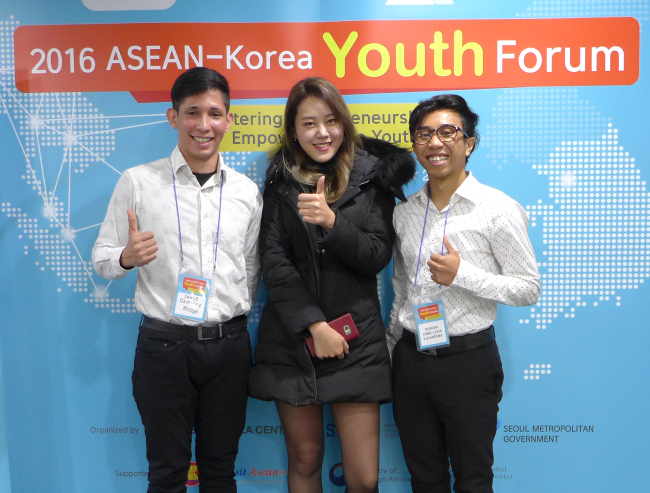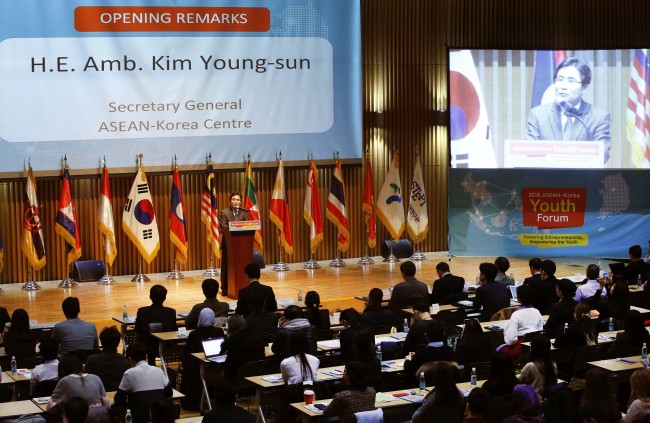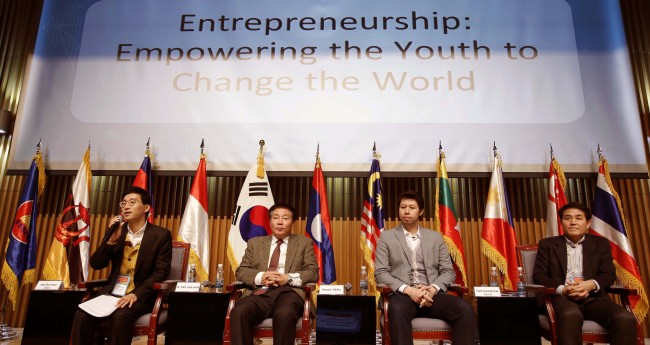The dream of Rendra Umbu Leha, an Indonesian student in Korea, is to improve his country’s health care system by commercializing prescription dispensing machines.
“It takes a long time for patients in Indonesia to describe their problems to doctors,” Leha told The Korea Herald last week.
“The machine would help them get accurate information about their health and facilitate medical services,” he added. “I believe it would also help fight corruption in our country, as the system would be transparent and precise.”
 |
Participants at the 2016 ASEAN-Korea Youth Forum pose at Seoul City Hall on Dec. 2. From left are Dante Ramirez Mollyk, a Peruvian student in Seoul, Korean entrepreneur Jang Sun-woo and Indonesian student Rendra Umbu Leha (Joel Lee / The Korea Herald) |
Leha, together with his teammate Dante Ramirez Mollyk, a Peruvian student in Seoul, were at the 2016 ASEAN-Korea Youth Forum, held on Dec. 2 at Seoul City Hall. The forum is aimed at encouraging entrepreneurship and knowledge exchange between young people in Korea and the Association of Southeast Asian Nations.
The Indonesian government is dedicated to providing quality health care to citizens, he said, but the process has been “less than ideal” due to various bureaucratic inefficiencies.
“Our President Joko Widodo really cares about his people,” Leha said. “His administration has tried hard to provide universal health care, particularly to lower-income people. Widodo himself is famous for talking directly to his people, one by one, eye to eye on the street, a practice known as ‘blusukan.’”
Pointing out that young Indonesians are keen users of social media such as Facebook, Twitter and Instagram, Leha advised potential entrepreneurs to actively embrace the platform for success.
 |
Participants at the 2016 ASEAN-Korea Youth Forum pose at Seoul City Hall on Dec. 2, which brought together 200 startup experts, bureaucrats and students from both regions. (ASEAN-Korea Center) |
The event was jointly organized by the ASEAN-Korea Center, the Science and Technology Policy Institute and Seoul Metropolitan Government. It brought together 200 startup experts, bureaucrats and students from both regions, with entrepreneurs giving lectures and sharing their experiences with students who presented business plans.
Mollyk, who received a Korean government scholarship, said he wanted to help people in developing countries with the prescription dispenser, as the health care systems there lagged behind those in developed countries.
“If you give opportunities to people to grow from the bottom up, through health care and education, the nation will grow,” he said. “It will probably not happen quickly in the short term, but surely over the mid-to-long term.”
Noting there was an economic boom across Latin America, Mollyk said the Peruvian government had promoted startups and entrepreneurship, although there had been difficulties.
“Through various diplomatic channels and industrial and defense collaboration, I know that Peru and Korea are working hard together,” he said, adding that Asia’s economic success, strong work ethic and exotic culture were popular in Spanish-speaking countries.
 |
ASEAN-Korea Center secretary-general Kim Young-sun speaks at the 2016 ASEAN-Korea Youth Forum pose at Seoul City Hall on Dec. 2. (ASEAN-Korea Center) |
“I believe in youth’s capacity to drive social change and sustainable development through innovation,” said Kim Young-sun, secretary-general of the ASEAN-Korea Center.
“I want to emphasize the importance of ‘creative passion.’ Simply being passionate is not enough to succeed in this digital age. You have to be creative and innovative at the same time.”
Highlighting that entrepreneurship is regarded as a key solution to youth unemployment and economic vitalization in Korea, the former career diplomat said ASEAN had made equally concerted efforts to nurture innovative and inclusive startups for young people.
Thai Ambassador to Korea Sarun Charoensuwan said that more than 96 percent of ASEAN’s businesses were small and medium-sized enterprises and 50 to 85 percent of its domestic employment involved SMEs.
“We live in an age of digitization and automation, where the internet and information technology have leveled the playing field for startups and small and medium-sized enterprises,” the envoy said.
 |
Startup experts speak at the 2016 ASEAN-Korea Youth Forum, aimed at encouraging entrepreneurship and knowledge exchanges between the youths of the Association of Southeast Asian Nations and Korea, at Seoul City Hall on Dec. 2. (ASEAN-Korea Center) |
“With Facebook, Instagram and other mobile applications becoming vital business tools, the ability to turn creative ideas into successful business models is crucial.”
Kim Chang-beom, ambassador for international relations for Seoul Metropolitan Government, underscored that ASEAN was Korea’s second-largest trade partner after China and its most popular travel destination.
“At the center of Korea’s burgeoning multicultural society are the 300,000 people from ASEAN, who contribute to the vitality of our communities, culture and economy,” Kim said.
Acknowledging today’s youths face harsh realities in looking for jobs and navigating “complex social and economic dilemmas,” he said the City of Seoul has fleshed out various policies and projects for younger people, including the Seoul Youth Policy Network, Seoul Youth Guarantee Center, youth allowance program and youth housing project.
By Joel Lee (
joel@heraldcorp.com)










![[Today’s K-pop] Blackpink’s Jennie, Lisa invited to Coachella as solo acts](http://res.heraldm.com/phpwas/restmb_idxmake.php?idx=644&simg=/content/image/2024/11/21/20241121050099_0.jpg)
